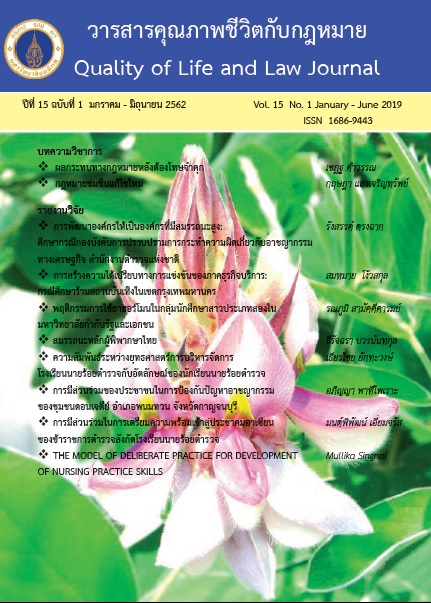Creating Competitive Avantage of Service Business: A Case of Entertainment Couplexts in Bangkok Metropolis
Main Article Content
Abstract
This research aims to 1) to study guidelines for business administration, entertainment restaurant that have a competitive advantage. 2) In order to study the way to manage the entertainment restaurants that have been successful and profitable. 3) To study the reason why do customers come to use the service at entertainment restaurant. Samples and population are 5 successful restaurant managers. 5 unsuccessful entertainment restaurant managers from 10 entertainment restaurant outlets. Employees who work in the shop, 20 peoples and customers who come to use the service with 60 peoples, select a specific type. Total of 90 interviewees. Conducting structured and semi-structured interviews.
The research found that. In the manager’s view, said guidelines for business management, entertainment restaurant outlets that have a competitive advantage is good relationship management with government officials responsible for the area. In the view of the staff, said the power of music and various music styles prepared by the entertainment restaurant for customer service is an important factor of competitive advantage. Second objective, management of entertainment restaurant to be successful and profitable from the management’s perspective, it was found that. Controlling operating costs and motivating employees is an important element in making the store profitable. In the view of most employees, the opinion that restaurant management to be successful and profitable comes from the shop focusing on good service Decoration of the atmosphere in the shop and beautiful. Third objective, the reason that customers come to use the service with the entertainment restaurant shop, most customers argue that because of the good atmosphere, the music because and the delicious food
Article Details
- บทความหรือข้อคิดเห็นใดๆ ในวารสารคุณภาพชีวิตกับกฎหมายเป็
- กองบรรณาธิการไม่สงวนสิทธิ์
References
วรเดช จัทรศร. (2558). การกำหนดนโยบายสาธารณ. กรุงเทพ : มหาวิทยาลัยชินวัตร
ศิริพงศ์ รักใหม่. (2552). ปัจจัยที่มีผลต่อความสำเร็จของผู้ประกอบการร้านอาหารและภัตรคาร: กรณีศึกษาผู้ประกอบการในเขตประเวศ และพระขโขนง กรุงเทพมหานคร. วิทยาลัยดุสิตธานี.
เสรีรัตน์ และ บุญเรือง. ( 2538). การตลาดการบริการ. กรุงเทพ : พัฒนศึกษา.
อัจฉรา รณกิตติ. (2555). รูปแบบความร่วมมือที่ส่งผลสำเร็จระหว่างบริษัทขายและผู้ซื้อของธุรกิจสินค้าห้องสะอาดในประเทศไทย. วิทยานิพนธ์บริหารธุรกิจดุษฎีบัณฑิต, มหาวิทยาลัยอีสเทิร์นเอเชีย.
Helleriegel, D., Slocum, J., & Woodman, R. (1995). Organizational behaviour. (8th Ed.). Ohio: South-Western College Publishing.
Gordon, J. R. (1999). Organization behavior: A diagnostic approach. (6th Ed.). Upper Saddle River: Prentice-Hall.
Kotler, P. (1995). Marketing Management: Analysis, planning, implementation and control (8 th Ed).Englewood Cliffs, New Jersey: Prentice-Hall.
Luthans, F. (1998). Organizational behavior. (8th Ed.). India: McGraw Hill.
Porter .M. E, (1980). Completive Strategy: Technic for analysis industry and competitors. New York Free Press.
Schermerhorn, J. R. (1999). Management. (6th Ed.). New York: John Wiley and Son.
Stoner, J. A. F., & Freeman, R. E. (1992). Management. (5th Ed.). Englewood Cliffs: Prentice-Hall.
Yamane, T. (1973). Statistics: An Introductory Analysis. (3rd Ed). New York: Harper & Row.

